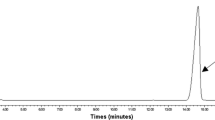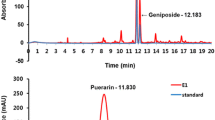Abstract
To find novel anti-inflammatory drugs, we screened anti-inflammatory compounds from 18 different types of Artemisia argyi seed extracts. The in vitro and in vivo anti-inflammatory activities of the screened compounds and their mechanisms were characterized. We first detected the cytotoxic effect of the compounds on RAW264.7 cells and the inhibitory effect on LPS-induced NO release. It was found that sesquiterpenoids CA-2 and CA-4 had low cytotoxic and strong NO inhibitory activity with an IC50 of 4.22 ± 0.61 μM and 2.98 ± 0.23 μM for NO inhibition, respectively. Therefore, compound CA-4 was studied in depth. We found that compound CA-4 inhibited LPS-induced pro-inflammatory factor production and M1 macrophage differentiation in RAW264.7 cells. Additionally, CA-4 inhibited the expression of p-ERK1/2, p-JNK, iNOS, and COX-2 by blocking the MAPK signaling pathway. CA-4 also promoted the expression of autophagy-related proteins such as LC3 II and Beclin-1 by inhibiting activation of the PI3K/AKT/mTOR signaling pathway, and promoted the generation of autophagosomes. Finally, CA-4 significantly inhibited the degree of inflammation in mice with acute peritonitis, showing good anti-inflammatory activity in vivo. Consequently, compound CA-4 may be a promising drug for the treatment of acute inflammatory diseases and provide new ideas for the synthesis of novel anti-inflammatory compounds.







Similar content being viewed by others
Data availability
All data that support the findings of this study are available from the corresponding author upon reasonable request.
Abbreviations
- AKT:
-
Protein kinase B
- COX-2:
-
Cyclooxygenase 2
- DEX:
-
Dexamethasone
- ERK1/2:
-
Extracellular regulated protein kinases 1/2
- iNOS:
-
Inducible nitric oxide synthase
- JNK:
-
C-Jun N-terminal kinase
- LPS:
-
Lipopolysaccharide
- MAPK:
-
Mitogen-activated protein kinase
- MCP-1:
-
Monocyte chemoattractant protein-1
- mTOR:
-
Mammalian target of rapamycin
- NSAIDs:
-
Nonsteroidal anti-inflammatory drugs
- PI3K:
-
Phosphatidylinositol-3-kinase
- SRB:
-
Sulfonyl rhodamine
- TEM:
-
Transmission electron microscopy
References
Ahmad N, Ansari MY, Bano S, Haqqi TM (2020) Imperatorin suppresses IL-1 beta-induced iNOS expression via inhibiting ERK-MAPK/AP1 signaling in primary human OA chondrocytes. Int Immunopharmacol. https://doi.org/10.1016/j.intimp.2020.106612
Bagchi AK, Malik A, Akolkar G, Jassal DS, Singal PK (2021) Endoplasmic reticulum stress promotes iNOS/NO and influences inflammation in the development of doxorubicin-induced cardiomyopathy. Antioxidants. https://doi.org/10.3390/antiox10121897
Behl T, Upadhyay T, Singh S, Chigurupati S, Alsubayiel AM, Mani V, Vargas-De-La-Cruz C, Uivarosan D, Bustea C, Sava C et al (2021) Polyphenols targeting MAPK mediated oxidative stress and inflammation in rheumatoid arthritis. Molecules. https://doi.org/10.3390/molecules26216570
Deng G, Li C, Chen L, Xing C, Fu C, Qian C, Liu X, Wang HY, Zhu M, Wang RF (2022) BECN2 (beclin 2) negatively regulates inflammasome sensors through ATG9A-dependent but ATG16L1- and LC3-independent non-canonical autophagy. Autophagy 18(2):340–356. https://doi.org/10.1080/15548627.2021.1934270
Deretic V, Levine B (2018) Autophagy balances inflammation in innate immunity. Autophagy 14(2):243–251. https://doi.org/10.1080/15548627.2017.1402992
Du T, Huang H, Chen X, Ding H, Zhang R, Liu M, Chen H (2014) LPS regulates macrophage autophagy through PI3K/Akt/mTOR pathway. Chinese J Pathophysiol 30(4):675–680
Essandoh K, Yang L, Wang X, Huang W, Qin D, Hao J, Wang Y, Zingarelli B, Peng T, Fan G-C (2015) Blockade of exosome generation with GW4869 dampens the sepsis-induced inflammation and cardiac dysfunction. Biochimica Et Biophysica Acta-Mol Basis Disease 1852(11):2362–2371. https://doi.org/10.1016/j.bbadis.2015.08.010
Ferrero-Miliani L, Nielsen OH, Andersen PS, Girardin SE (2007) Chronic inflammation: importance of NOD2 and NALP3 in interleukin-1 beta generation. Clin Exp Immunol 147(2):227–235. https://doi.org/10.1111/j.1365-2249.2006.03261.x
Foley N, Wang JH, Redmond HP (2013) Macrophage polarisation. Ir J Med Sci 182:S354–S354
Gomez-Zorrilla S, Calatayud L, Juan C, Cabot G, Tubau F, Oliver A, Angeles Dominguez M, Ariza J, Pena C (2017) Understanding the acute inflammatory response to Pseudomonas aeruginosa infection: differences between susceptible and multidrug-resistant strains in a mouse peritonitis model. Int J Antimicrobial Agents 49(2):198–203. https://doi.org/10.1016/j.ijantimicag.2016.10.016
Hughes SD, Ketheesan N, Haleagrahara N (2017) The therapeutic potential of plant flavonoids on rheumatoid arthritis. Crit Rev Food Sci Nutr 57(17):3601–3613. https://doi.org/10.1080/10408398.2016.1246413
Inyang KE, Folger JK, Laumet G (2021) Can FDA-approved immunomodulatory drugs be repurposed/repositioned to alleviate chronic pain? J Neuroimmune Pharmacol 16(3):531–547. https://doi.org/10.1007/s11481-021-10000-z
Jang JY, Lee SH, Shim H, Choi JY, Yong D, Lee JG (2015) Epidemiology and microbiology of secondary peritonitis caused by viscus perforation: a single-center retrospective study. Surg Infect 16(4):436–442. https://doi.org/10.1089/sur.2014.148
Kim D-G, Kang M-J, Shin J-H (2016) Hepatoprotective effects of sumaeyaksuk (Artemisia argyi H.) extract on LPS-mediated inflammatory response. J Life Sci 26(11):1282–1288
Lee Y-JI, Kim B-M, Ahn Y-H, Choi JH, Choi Y-H, Kang JL (2021) STAT6 signaling mediates PPAR gamma activation and resolution of acute sterile inflammation in mice. Cells. https://doi.org/10.3390/cells10030501
Lee Y-J, Kim K, Kim M, Ahn Y-H, Kang JL (2022) Inhibition of STAT6 activation by AS1517499 inhibits expression and activity of PPAR gamma in macrophages to resolve acute inflammation in mice. Biomolecules. https://doi.org/10.3390/biom12030447
Levine B, Mizushima N, Virgin HW (2011) Autophagy in immunity and inflammation. Nature 469(7330):323–335. https://doi.org/10.1038/nature09782
Li J, Du J, Liu D, Cheng B, Fang F, Weng L, Wang C, Ling C (2014) Ginsenoside Rh1 potentiates dexamethasone’s anti-inflammatory effects for chronic inflammatory disease by reversing dexamethasone-induced resistance. Arthritis Res Therapy. https://doi.org/10.1186/ar4556
Lin J, Lu Z, Li G, Zhang C, Lu H, Gao S, Zhu R, Huang H, Aden K, Wang J et al (2022) MCPIP-1-mediated immunosuppression of neutrophils exacerbates acute bacterial peritonitis and liver injury. J Innate Immun. https://doi.org/10.1159/000526784
Liu R, Li X, Ma H, Yang Q, Shang Q, Song L, Zheng Z, Zhang S, Pan Y, Huang P et al (2020) Spermidine endows macrophages anti-inflammatory properties by inducing mitochondrial superoxide-dependent AMPK activation, Hif-1 alpha upregulation and autophagy. Free Radical Biol Med 161:339–350. https://doi.org/10.1016/j.freeradbiomed.2020.10.029
Liu Y, He Y, Wang F, Xu R, Yang M, Ci Z, Wu Z, Zhang D, Lin J (2021) From longevity grass to contemporary soft gold: explore the chemical constituents, pharmacology, and toxicology of Artemisia argyi H.Lev. & vaniot essential oil. J Ethnopharmacol. https://doi.org/10.1016/j.jep.2021.114404
Luo D-Y, Yan Z-T, Che L-R, Zhu JJ, Chen B (2022) Repellency and insecticidal activity of seven Mugwort (Artemisia argyi) essential oils against the malaria vector Anopheles sinensis. Sci Reports. https://doi.org/10.1038/s41598-022-09190-0
Mehta P, Henault J, Kolbeck R, Sanjuan MA (2014) Noncanonical autophagy: one small step for LC3, one giant leap for immunity. Current Opinion Immunol 26:69–75. https://doi.org/10.1016/j.coi.2013.10.012
Mylka V, Deckers J, Ratman D, De Cauwer L, Thommis J, De Rycke R, Impens F, Libert C, Tavernier J, Vanden Berghe W et al (2018) The autophagy receptor SQSTM1/p62 mediates anti-inflammatory actions of the selective NR3C1/glucocorticoid receptor modulator compound A (CpdA) in macrophages. Autophagy 14(12):2049–2064. https://doi.org/10.1080/15548627.2018.1495681
Napolitano LM (2022) Intra-abdominal Infections. Semin Respir Crit Care Med 43(01):10–27. https://doi.org/10.1055/s-0041-1741053
Nofi CP, Wang P, Aziz M (2022) Chromatin-associated molecular patterns (CAMPs) in sepsis. Cell Death Disease. https://doi.org/10.1038/s41419-022-05155-3
Oishi Y, Manabe I (2018) Macrophages in inflammation, repair and regeneration. Int Immunol 30(11):511–528. https://doi.org/10.1093/intimm/dxy054
Pineda-Torra I, Gage M, de Juan A, Pello OM (2015) Isolation, culture, and polarization of murine bone marrow-derived and peritoneal macrophages. Methods Mol Biol 1339:101–109. https://doi.org/10.1007/978-1-4939-2929-0_6
Ross JT, Matthay MA, Harris HW (2018) Secondary peritonitis: principles of diagnosis and intervention. Bmj-British Med J. https://doi.org/10.1136/bmj.k1407
Sartelli M, Abu-Zidan FM, Labricciosa FM, Kluger Y, Coccolini F, Ansaloni L, Leppaniemi A, Kirkpatrick AW, Tolonen M, Trana C et al (2019) Physiological parameters for prognosis in abdominal sepsis (PIPAS) study: a WSES observational study. World J Emerg Surg. https://doi.org/10.1186/s13017-019-0253-2
Seo JM, Kang HM, Son KH, Kim JH, Lee CW, Kim HM, Chang SI, Kwon BM (2003) Antitumor activity of flavones isolated from Artemisia argyi. Planta Med 69(3):218–222. https://doi.org/10.1055/s-2003-38486
Sheppe AEF, Santelices J, Czyz DM, Edelmann MJ (2021) Yersinia pseudotuberculosis YopJ limits macrophage response by downregulating COX-2-mediated biosynthesis of PGE2 in a MAPK/ERK-dependent manner. Microbiol Spectr. https://doi.org/10.1128/Spectrum.00496-21
Sun L-D, Wang F, Dai F, Wang Y-H, Lin D, Zhou B (2015) Development and mechanism investigation of a new piperlongumine derivative as a potent anti-inflammatory agent. Biochem Pharmacol 95(3):156–169. https://doi.org/10.1016/j.bcp.2015.03.014
Tochie JN, Agbor NV, Frank Leonel TT, Mbonda A, Aji Abang D, Danwang C (2020) Global epidemiology of acute generalised peritonitis: a protocol for a systematic review and meta-analysis. BMJ Open. https://doi.org/10.1136/bmjopen-2019-034326
Ulloa L, Tracey KJ (2005) The “cytokine profile”: a code for sepsis. Trends Mol Med 11(2):56–63. https://doi.org/10.1016/j.molmed.2004.12.007
Viola A, Munari F, Sanchez-Rodriguez R, Scolaro T, Castegna A (2019) The metabolic signature of macrophage responses. Front Immunol. https://doi.org/10.3389/fimmu.2019.01462
Xie W, Zheng W, Liu M, Qin Q, Zhao Y, Cheng Z, Guo F (2018) BRF1 ameliorates LPS-induced inflammation through autophagy crosstalking with MAPK/ERK signaling. Genes Diseases 5(3):226–234. https://doi.org/10.1016/j.gendis.2018.04.004
Xu H-D, Qin Z-H (2019) Beclin 1, Bcl-2 and Autophagy. Autophagy Biol Diseases Basic Sci 1206:109–126
Xue Q, Yan Y, Zhang R, Xiong H (2018) Regulation of iNOS on immune cells and its role in diseases. Int J Mol Sci. https://doi.org/10.3390/ijms19123805
Xue G-M, Zhu D-R, Zhu T-Y, Wang X-B, Luo J-G, Kong L-Y (2019) Lactone ring-opening seco-guaianolide involved heterodimers linked via an ester bond from Artemisia argyi with NO inhibitory activity. Fitoterapia 132:94–100. https://doi.org/10.1016/j.fitote.2018.12.004
Xue G, Zhao C, Xue J, Xing G, Zhao Z, Du K, Si Y, Sun Y, Feng W (2022) Chemical constituents from seeds of Artemisia argyi. Chinese Tradit Herbal Drugs 53(9):2605–2611
Yang Y-X, Shan L, Liu Q-X, Shen Y-H, Zhang J-P, Ye J, Xu X-K, Li H-L, Zhang W-D (2014) Carpedilactones A-D, four new isomeric Sesquiterpene lactone dimers with potent cytotoxicity from Carpesium faberi. Organic Lett 16(16):4216–4219. https://doi.org/10.1021/ol501923k
Acknowledgements
Thanks to the Key Laboratory of Advanced Pharmaceutical Preparation Technology, Ministry of Education; School of Pharmaceutical Sciences, Zhengzhou University; and State Key Laboratory of Esophageal Cancer Prevention & Treatment; School of Pharmaceutical Sciences, Zhengzhou University for providing the experimental platform.
Funding
This work was supported by the Joint Fund of Provincial Science and Technology Research and Development Plan of Henan Province (Advantageous Discipline Cultivation) (Project No. 222301420057), The Open Project of Henan International Joint Laboratory of Prevention and Treatment of Pediatric Diseases, (Project No. EKB202202), and The Open Project of Henan Neurodevelopment Engineering Research Center for Children (Project No. SG202201).
Author information
Authors and Affiliations
Contributions
YL: conceptualization, validation, and writing—original draft. YW: methodology, investigation, data curation, and writing—original draft. TL: methodology, data curation, and writing—original draft. ZL: methodology, TG: methodology. GX: conceptualization. YD: conceptualization and funding acquisition. YY: conceptualization, funding acquisition, supervision, and writing—review & editing.
Corresponding authors
Ethics declarations
Conflict of interest
The authors declare no conflict of interest regarding the publication of this review article.
Additional information
Publisher's Note
Springer Nature remains neutral with regard to jurisdictional claims in published maps and institutional affiliations.
Rights and permissions
Springer Nature or its licensor (e.g. a society or other partner) holds exclusive rights to this article under a publishing agreement with the author(s) or other rightsholder(s); author self-archiving of the accepted manuscript version of this article is solely governed by the terms of such publishing agreement and applicable law.
About this article
Cite this article
Li, Y., Wang, Y., Li, T. et al. Sesquiterpene from Artemisia argyi seed extracts: A new anti-acute peritonitis agent that suppresses the MAPK pathway and promotes autophagy. Inflammopharmacol 32, 447–460 (2024). https://doi.org/10.1007/s10787-023-01297-8
Received:
Accepted:
Published:
Issue Date:
DOI: https://doi.org/10.1007/s10787-023-01297-8




